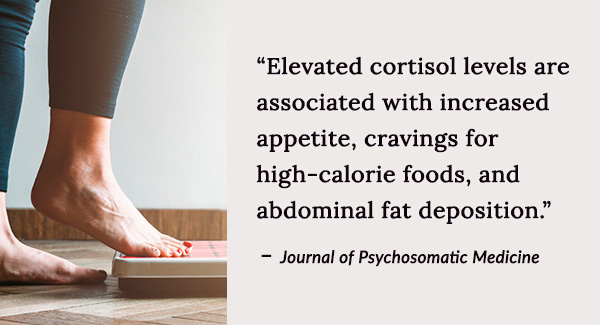Authored by Dr. Mary James, ND
For many years we’ve known that the high cortisol levels that result from chronic stress can be linked with weight gain, especially belly fat (midsection weight).
This type of weight gain is not usually connected to overeating.
Sure, some women may eat more to get a boost of energy when they’re feeling tired and frazzled, but when stress goes unchecked and cortisol levels become dysregulated, it doesn’t really matter how many calories we take in.

When stress is constant, your body goes into survival mode and stores fat — a holdover response from when food was hard for humans to find. That means we become weight loss resistant — because the body won’t let go of that fat reserve until the stress that triggered the fat storage is gone or reduced.
Three ways stress is connected to weight gain
When looking at the links between stress and weight gain, researchers conclude that over time the release of stress hormones, like cortisol, can do three major things to cause weight gain:

Release stubborn weight by balancing your stress hormones
You can ease your body away from holding on to extra weight by supporting your adrenal glands, which are responsible for dealing with stress and releasing cortisol. The best ways to restore the adrenal glands include:
Adjusting your eating habits.
If you see fat as your food enemy, we suggest you take a closer look at your carbohydrate intake. Many women replace fat with alternatives high in simple carbohydrates, which contribute to insulin resistance and weight gain. Try to limit your carbohydrate intake to 16 grams at every meal and 7 grams per snack.
Finding methods to cultivate calm.
Stress in all forms can contribute to adrenal imbalance. Even things you may not think of, such as being “on the go” all of the time. That’s why it’s so important to make time for yourself and to s-l-o-w d-o-w-n.
Using phytotherapeutic compounds to calm cortisol overproduction.
Even when you can’t change the stress in your life, you can help reduce its effects on your weight and overall health with hormone-balancing herbal and natural compounds that curb excess cortisol production and help you bring this prime stress hormone back into balance. Our exclusive Serinisol formula contains L-theanine, passionflower and phosphatidylserine, all proven ingredients for restoring cortisol balance and helping to finally break the stress-weight resistance cycle.
Changing how your body responds to stress can make all the difference when you need to lose extra pounds, and we’re here to make it easier for you.
References and further reading
Adam, T., & Epel, E. 2007. Stress, eating, and the reward system. Physiol. Behav., 91(4), 449–458 (accessed 03.04.2009).
Torres, S., & Nowson, C. 2007. Relationship between stress, eating behavior, and obesity. Nutrition, 23 (11–12), 887–894. (accessed 03.04.2009).
Gluck, M. 2006. Stress response and binge eating disorder. Appetite, 46 (1), 26–30. (accessed 03.04.2009).
Gluck, M., et al. 2004. Cortisol stress response is positively correlated with central obesity in obese women with binge eating disorder (BED) before and after cognitive-behavioral treatment. Ann. NY Acad. Sci., 1032, 204–207. (accessed 03.04.2009).
Pasquali, et al. 1998. Pulsatile secretion of ACTH and cortisol in premenopausal women: Effect of obesity and body fat distribution. Clin. Endocrinol. (Oxf.), 48 (5), 603–612. (accessed 03.05.2009).
Dallman, M., et al. 2003. Chronic stress and obesity: A new view of “comfort food.” PNAS, 100 (20), 11696–11701. (accessed 03.02.2009).












